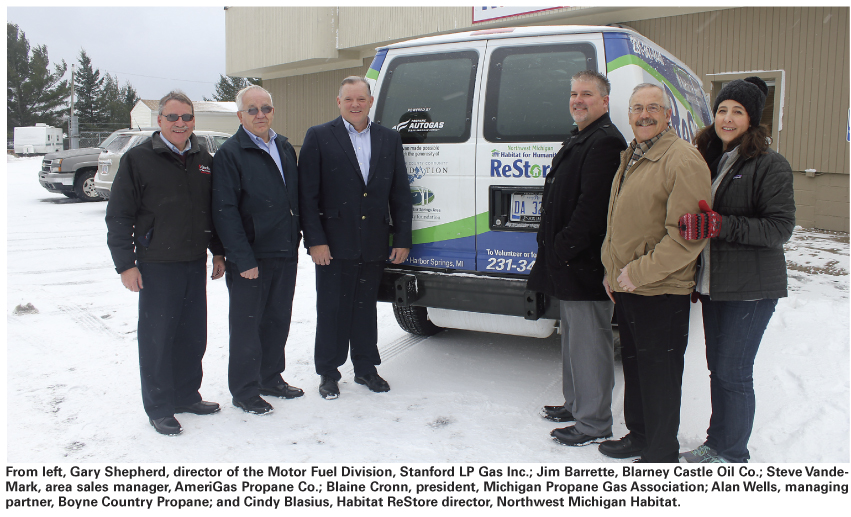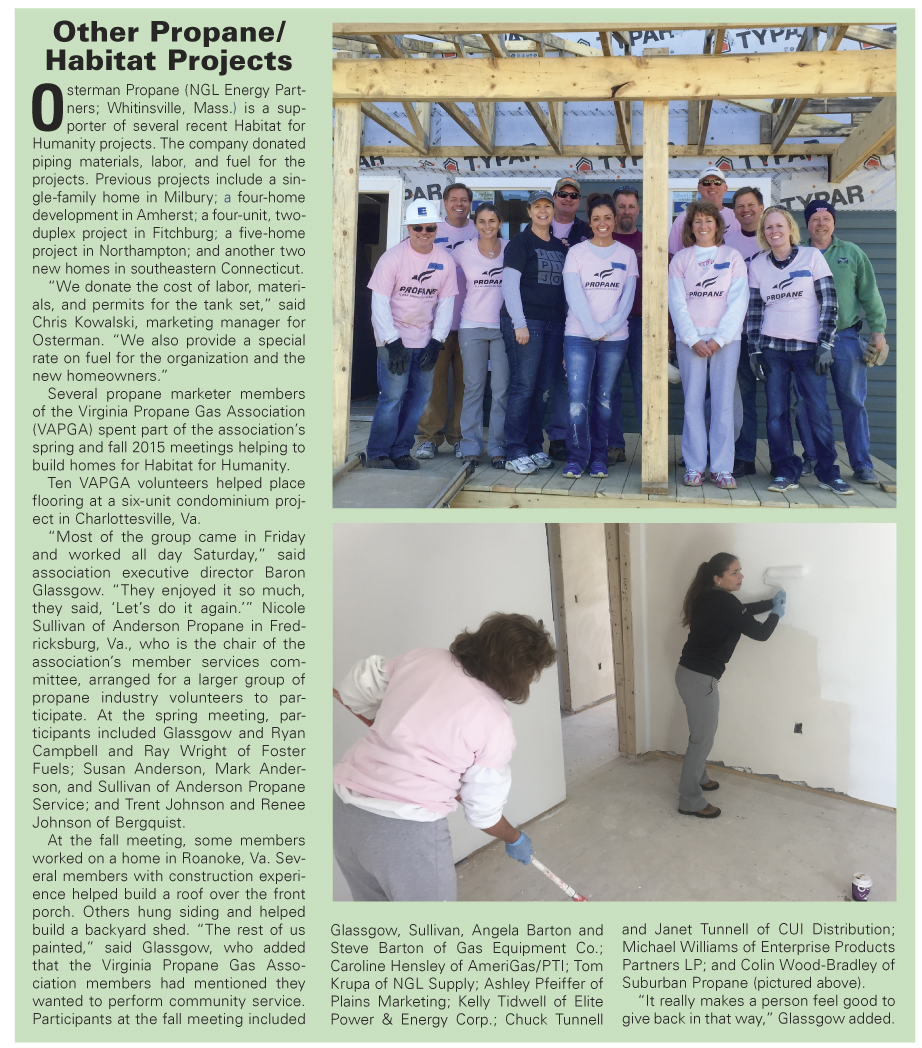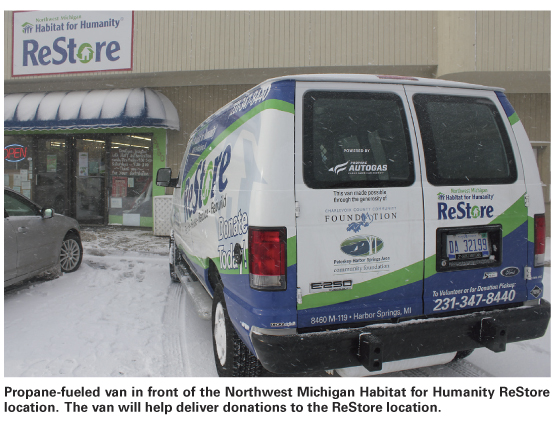Wednesday, January 13, 2016
“A world where everyone has a decent place to live” is the vision of international charity Habitat for Humanity, which builds affordable housing for people in need. The organization’s website also notes that “Whenever possible, we build sustainable, energy-efficient, and healthy housing.” Lani Laporte, executive director of Northwest Michigan Habitat for Humanity, an affiliate of Habitat for Humanity International, says the organization has built many 5-Star Energy Star Homes, and a good number of the rural-area homes that the chapter has built use propane as an energy source. The two-county affiliate recently needed to purchase a van for picking up items donated to its ReStore thrift store, and because propane has been such an important fuel in the area, Laporte and her team looked at propane autogas options. 
“We’re not afraid of using propane, and the thought was, wouldn’t it be a great partnership for the local Habitat here to be able to run [its] van off propane, too, to show people that there are alternative-fuel options for gasoline?” commented Laporte, who lives three miles from her Habitat for Humanity office in the rural area of Harbor Springs, Mich. Habitat’s Northwest Michigan affiliate is located in a resort area on Lake Michigan that includes many second homes of affluent visitors, and outside of the small town limits, most homes use propane for heating. “There’s a lot of propane around here,” she said. “I heat my home with propane and my dryer runs off propane.” The affiliate eventually chose a 2015 Ford Econoline van and had it converted to propane with the assistance of the Michigan Propane Gas Association.
Habitat for Humanity, a 501(c)(3) nonprofit organization, “builds safe affordable housing for low-income families,” Laporte explained. Her affiliate is an authorized affiliate for Habitat Humanity International, “which operates in just about every country in the world.”
When workers for the local affiliate are building homes, a temporary tank from the local AmeriGas office usually supplies jobsite heat. Once the sale of the house closes, the new homeowner decides which company to use as his or her propane provider. AmeriGas, Ferrellgas, Blarney Castle, and Boyne Country Propane are among the propane companies with locations in the area.
For picking up donated items, the group already owned a larger van but needed a second, especially during the busy summer season. The group sought a smaller van for the many smaller donations it receives, including items such as dishware, linens, curtains, and plumbing fixtures. “We don’t do clothes,” Laporte noted. “We’re not Goodwill or the Salvation Army. We use the money to build houses.”
Laporte knew that propane autogas would be favorably priced compared to gasoline in the long run. She realizes that although gasoline prices are low now, that won’t always be the case. Remembering when gasoline prices were nearly $5 per gallon several years back, Laporte also remembers the price spike in propane during the winter of 2013-2014. Propane also jumped last year in her area, which experienced temperatures of –27°F this past February. Many local residents were short on propane supply.
In 2014, Laporte met with Tom Jaenicke as a co-member of the local homebuilders association. Jaenicke is a propane industry consultant who is active with the Michigan Propane Gas Association (MPGA) and who is currently based in Michigan as vice president of propane marketing services for Warm Thoughts Communications (Clifton, N.J.). MPGA has been a sponsor of the Habitat Michigan annual state awards dinner for several years. The deal came together when the project qualified for partial funding as a propane autogas demonstration project under the Propane Education & Research Council’s Partnership Dollar program.

After consulting with Jaenicke and MPGA as partners in the project, Laporte and her team bought the Econoline van from a local dealer with funding assistance from the Charlevoix Area Community Foundation and the Petoskey Harbor-Springs Area Community Foundation. The project partnership was extended to include Stanford LP Gas, Motor Fuel Division (Midland, Mich.), which installed the Icom North America (New Hudson, Mich.) EPA-certified liquid-injection, bi-fuel propane system on the van, and the association donated 1000 gallons of propane, approximately a one-year supply. Jaenicke lined up several propane marketers to provide the fuel, including Harbor Park EZ Mart, a Blarney Castle station near the Habitat facility. Boyne Country Propane and AmeriGas also provide propane autogas to the organization for use in the van. Local propane providers, as well as Habitat staff, are being trained on safety measures and the proper filling techniques for propane-fueled vehicles.
At the time this article was written, the Habitat van had only been in service for a few weeks, but the group has had a positive reaction so far. Drivers have transitioned smoothly to the new vehicle. “It’s almost unnoticeable that you’re operating on propane vs. gasoline,” Laporte said. “And the conversion to [bi-] fuel by an authorized provider allows Ford Motor Co. to honor its original warranty.” She has heard no reports of drivers switching the vehicle to run on gasoline.
The van is important to Habitat operations in various ways. Habitat affiliate corporations have the opportunity to open thrift stores as a primary means of funding operations and housing program services. The shops are called ReStores, and the one that the Northwest Michigan affiliate runs is one of the top revenue producing ReStore locations in the state. When someone contacts the chapter to donate items, Laporte wants a quick response and to get the truck to the donor’s location quickly. “This is going to help us to keep our ReStore donors and our customers happy, while providing increased inventory and dollars to support our mission,” emphasized Laporte.
Building safe, affordable housing for lower-income families in Emmet and Charlevoix Counties is the affiliate’s mission, and many of the Habitat homes in northwest Michigan use propane, mostly for heating and clothes drying. Habitat’s work is a great help for many lower-income service industry workers in the area who serve the local economy, including summer residents. Although employed, many in the local service industry are challenged to afford basic necessities. Laporte quoted a 2014 Rutgers University study of affordability, the ALICE report, which refers to them as “asset limited, income constrained, employed” individuals. The report findings identified that nearly 38% of the population in the two counties served by the Habitat affiliate are unable to afford basic housing and living expenses, so the demand for Habitat services is increasing.
“Folks working in the service area and seeking affordable housing are my customers, and most of them will live outside city limits and utilize propane as their primary home energy/heat source,” said Laporte, who uses Blarney Castle as a propane provider for her personal home. “Winters like last winter, when it was 27° below, were expensive. I prepaid a whole year for my propane last year in advance to get the best price, but used it all up before the end of the winter season. Normally that doesn’t happen. Last winter year-round residents were maxing out their propane fuel usage and were financially unable to purchase more fuel. By the end of the season, many Habitat homeowners in the area were turning to the local community action agency, among other agencies, seeking funding assistance to purchase fuel for families that couldn’t afford to heat their home for the remainder of the winter.” Laporte has suggested that an opportunity for partnership exists between Habitat and MPGA to help fund a program of emergency propane assistance for families that cannot afford heat during some of northern-lower Michigan’s long cold winters.
Jaenicke notes that the partnership between the Michigan association and Northwest Michigan Habitat for Humanity is a way for the propane industry to perform good deeds. But it also serves as a gallon growing opportunity. After the 1000-gal. propane donation is used up, that van will continue to run on propane and save Habitat more money to put toward housing program services. It also builds positive awareness of the propane industry and provides a way for Michigan propane marketers to persuade local builders to use more propane on their construction projects.
MPGA has participated in the Habitat chapter’s Affiliates in Motion (AIM) conference for Habitat affiliates, which are community-level Habitat for Humanity offices that serve specific areas. During one of the conferences, Jaenicke met Thom Phillips, sustainable building specialist for Habitat for Humanity of Michigan, who is in charge of the organization’s green building design. As a result, Jaenicke was invited to make a presentation at the 2016 Habitat HOMES Green Building Summit, covering tankless water heaters and how to efficiently heat water for Habitat homes with propane. “We will have an opportunity to influence the number of gas appliances in Habitat homes being built throughout the state,” Jaenicke noted.
“When Habitat starts building a home for a partner family, the tradespeople and volunteers who are building the home see a propane company involved, and that can lead to other opportunities for the propane company.” —Daryl Lubinsky

“We’re not afraid of using propane, and the thought was, wouldn’t it be a great partnership for the local Habitat here to be able to run [its] van off propane, too, to show people that there are alternative-fuel options for gasoline?” commented Laporte, who lives three miles from her Habitat for Humanity office in the rural area of Harbor Springs, Mich. Habitat’s Northwest Michigan affiliate is located in a resort area on Lake Michigan that includes many second homes of affluent visitors, and outside of the small town limits, most homes use propane for heating. “There’s a lot of propane around here,” she said. “I heat my home with propane and my dryer runs off propane.” The affiliate eventually chose a 2015 Ford Econoline van and had it converted to propane with the assistance of the Michigan Propane Gas Association.
Habitat for Humanity, a 501(c)(3) nonprofit organization, “builds safe affordable housing for low-income families,” Laporte explained. Her affiliate is an authorized affiliate for Habitat Humanity International, “which operates in just about every country in the world.”
When workers for the local affiliate are building homes, a temporary tank from the local AmeriGas office usually supplies jobsite heat. Once the sale of the house closes, the new homeowner decides which company to use as his or her propane provider. AmeriGas, Ferrellgas, Blarney Castle, and Boyne Country Propane are among the propane companies with locations in the area.
For picking up donated items, the group already owned a larger van but needed a second, especially during the busy summer season. The group sought a smaller van for the many smaller donations it receives, including items such as dishware, linens, curtains, and plumbing fixtures. “We don’t do clothes,” Laporte noted. “We’re not Goodwill or the Salvation Army. We use the money to build houses.”
Laporte knew that propane autogas would be favorably priced compared to gasoline in the long run. She realizes that although gasoline prices are low now, that won’t always be the case. Remembering when gasoline prices were nearly $5 per gallon several years back, Laporte also remembers the price spike in propane during the winter of 2013-2014. Propane also jumped last year in her area, which experienced temperatures of –27°F this past February. Many local residents were short on propane supply.
In 2014, Laporte met with Tom Jaenicke as a co-member of the local homebuilders association. Jaenicke is a propane industry consultant who is active with the Michigan Propane Gas Association (MPGA) and who is currently based in Michigan as vice president of propane marketing services for Warm Thoughts Communications (Clifton, N.J.). MPGA has been a sponsor of the Habitat Michigan annual state awards dinner for several years. The deal came together when the project qualified for partial funding as a propane autogas demonstration project under the Propane Education & Research Council’s Partnership Dollar program.

After consulting with Jaenicke and MPGA as partners in the project, Laporte and her team bought the Econoline van from a local dealer with funding assistance from the Charlevoix Area Community Foundation and the Petoskey Harbor-Springs Area Community Foundation. The project partnership was extended to include Stanford LP Gas, Motor Fuel Division (Midland, Mich.), which installed the Icom North America (New Hudson, Mich.) EPA-certified liquid-injection, bi-fuel propane system on the van, and the association donated 1000 gallons of propane, approximately a one-year supply. Jaenicke lined up several propane marketers to provide the fuel, including Harbor Park EZ Mart, a Blarney Castle station near the Habitat facility. Boyne Country Propane and AmeriGas also provide propane autogas to the organization for use in the van. Local propane providers, as well as Habitat staff, are being trained on safety measures and the proper filling techniques for propane-fueled vehicles.
At the time this article was written, the Habitat van had only been in service for a few weeks, but the group has had a positive reaction so far. Drivers have transitioned smoothly to the new vehicle. “It’s almost unnoticeable that you’re operating on propane vs. gasoline,” Laporte said. “And the conversion to [bi-] fuel by an authorized provider allows Ford Motor Co. to honor its original warranty.” She has heard no reports of drivers switching the vehicle to run on gasoline.
The van is important to Habitat operations in various ways. Habitat affiliate corporations have the opportunity to open thrift stores as a primary means of funding operations and housing program services. The shops are called ReStores, and the one that the Northwest Michigan affiliate runs is one of the top revenue producing ReStore locations in the state. When someone contacts the chapter to donate items, Laporte wants a quick response and to get the truck to the donor’s location quickly. “This is going to help us to keep our ReStore donors and our customers happy, while providing increased inventory and dollars to support our mission,” emphasized Laporte.
Building safe, affordable housing for lower-income families in Emmet and Charlevoix Counties is the affiliate’s mission, and many of the Habitat homes in northwest Michigan use propane, mostly for heating and clothes drying. Habitat’s work is a great help for many lower-income service industry workers in the area who serve the local economy, including summer residents. Although employed, many in the local service industry are challenged to afford basic necessities. Laporte quoted a 2014 Rutgers University study of affordability, the ALICE report, which refers to them as “asset limited, income constrained, employed” individuals. The report findings identified that nearly 38% of the population in the two counties served by the Habitat affiliate are unable to afford basic housing and living expenses, so the demand for Habitat services is increasing.
“Folks working in the service area and seeking affordable housing are my customers, and most of them will live outside city limits and utilize propane as their primary home energy/heat source,” said Laporte, who uses Blarney Castle as a propane provider for her personal home. “Winters like last winter, when it was 27° below, were expensive. I prepaid a whole year for my propane last year in advance to get the best price, but used it all up before the end of the winter season. Normally that doesn’t happen. Last winter year-round residents were maxing out their propane fuel usage and were financially unable to purchase more fuel. By the end of the season, many Habitat homeowners in the area were turning to the local community action agency, among other agencies, seeking funding assistance to purchase fuel for families that couldn’t afford to heat their home for the remainder of the winter.” Laporte has suggested that an opportunity for partnership exists between Habitat and MPGA to help fund a program of emergency propane assistance for families that cannot afford heat during some of northern-lower Michigan’s long cold winters.

Jaenicke notes that the partnership between the Michigan association and Northwest Michigan Habitat for Humanity is a way for the propane industry to perform good deeds. But it also serves as a gallon growing opportunity. After the 1000-gal. propane donation is used up, that van will continue to run on propane and save Habitat more money to put toward housing program services. It also builds positive awareness of the propane industry and provides a way for Michigan propane marketers to persuade local builders to use more propane on their construction projects.
MPGA has participated in the Habitat chapter’s Affiliates in Motion (AIM) conference for Habitat affiliates, which are community-level Habitat for Humanity offices that serve specific areas. During one of the conferences, Jaenicke met Thom Phillips, sustainable building specialist for Habitat for Humanity of Michigan, who is in charge of the organization’s green building design. As a result, Jaenicke was invited to make a presentation at the 2016 Habitat HOMES Green Building Summit, covering tankless water heaters and how to efficiently heat water for Habitat homes with propane. “We will have an opportunity to influence the number of gas appliances in Habitat homes being built throughout the state,” Jaenicke noted.
“When Habitat starts building a home for a partner family, the tradespeople and volunteers who are building the home see a propane company involved, and that can lead to other opportunities for the propane company.” —Daryl Lubinsky

